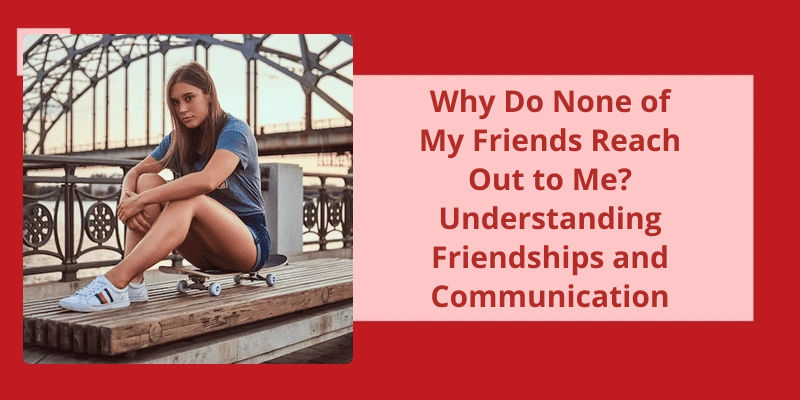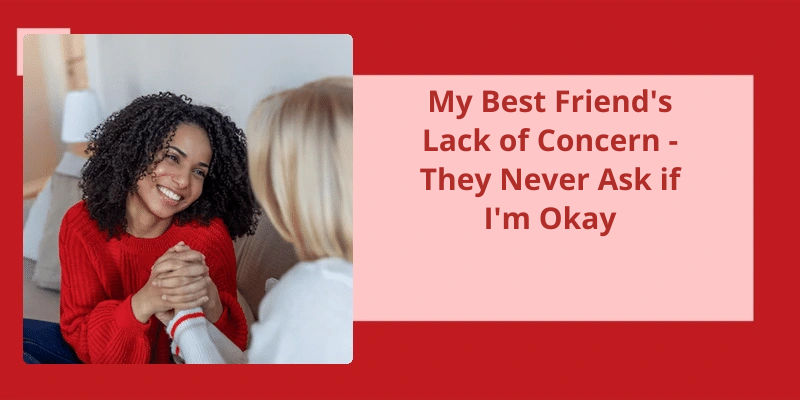As human beings, it's natural to crave connection and belonging. We seek out social interaction with others to share our experiences, support each other through tough times, and feel valued. However, sometimes it can feel like we're on the outside looking in when our friends don't reach out to us. It can be easy to take this personally, but it's important to remember that there are a variety of reasons why someone may not initiate contact with us. Some people are simply more introverted or reserved than others, while others may struggle with social anxiety or feel uncomfortable starting a conversation. Whatever the reason may be, it's important to try to approach the situation with understanding and empathy towards our friends.
Why Do Friends Stop Reaching Out?
However, it’s important to approach the situation with empathy and understanding. Sometimes, people go through difficult times or struggle with mental health issues that can make them withdraw from social situations. If you suspect this may be the case, it may be worth reaching out to them with a message of support and letting them know that youre there for them if they need someone to talk to.
Another reason why friends might stop reaching out is that their priorities and interests have shifted. This can happen as people grow and change over time, and it’s important to recognize that it’s a natural part of life. While it can be disappointing, it’s also an opportunity to meet new people who share your current values and interests.
It’s also possible that there’s been a rift or conflict between you and your friend, which is causing them to distance themselves. In this case, it may be worth trying to address the issue through open and honest communication. If youre willing to put in the effort to repair the relationship, it can be a powerful way to strengthen your bond.
On the other hand, it’s important to recognize when it’s time to let go of a friendship that’s no longer serving you. If your friend consistently cancels plans or makes excuses for not spending time with you, it may be a sign that they arent interested in maintaining the relationship. In this case, it’s best to be honest with yourself and your friend about your feelings, and move on in a healthy way.
However, by being aware of the signs and approaching the situation with empathy and understanding, you can navigate these changes in a positive way. Whether you try to repair the relationship or move on, remember that the most important thing is to prioritize your own well-being and surround yourself with people who bring you joy and positivity.
The Impact of Social Media on Friendships and Communication Patterns
Social media has had a significant impact on friendships and communication patterns by providing an avenue for individuals to connect and maintain their relationships. However, it’s also led to a potential decline in face-to-face communication and the development of shallow, surface-level friendships.
It’s important to acknowledge that sometimes, a friend distancing themselves from you can be a result of a natural separation that often happens due to changes in interests, schedules, or locations. However, if you’ve noticed a significant shift in your friendship, it could be worth exploring some possible reasons behind their behavior.
Why Would a Friend Distancing Themselves From You?
It’s important to note, however, that there could also be external factors in play that affect your friendship. Perhaps they’re going through a difficult time in their life and need some space to sort out their emotions. Alternatively, they may have taken up new hobbies or have new friends they spend a considerable amount of time with. While this may not necessarily mean they’re distancing themselves from you on purpose, it could still lead to fewer interactions between the two of you.
In some cases, a friend may distance themselves from you as a result of miscommunication or misunderstanding. This could stem from a conflict or disagreement that was not properly addressed, leading to hurt or anger lingering beneath the surface. In these situations, it’s important to have an open and honest conversation with your friend to clarify any misunderstandings and work towards resolving any conflicts that may be present.
Avoid becoming defensive or accusatory, and instead try to listen to their perspective and seek to understand their point of view. Honesty and open communication are key to maintaining healthy relationships, and with time and effort, it may be possible to mend the friendship.
It can be frustrating always being the one to initiate contact with friends, but it’s important to remember that there may be underlying reasons for their lack of communication. In some cases, this could be due to their own shyness, introversion, or insecurities. One example of this is when a friend withdraws after experiencing a significant life change, such as a job loss or breakup.
Why Am I the Only One Who Initiate Contact With Friends?
They might be feeling down and insecure, and as a result, withdraw from social interactions. In these situations, it’s up to you to be understanding and patient with your friend, and to continue reaching out to them until they feel better about themselves. Once they do, theyll likely be more responsive and proactive in your friendship.
Another possibility is that your friend is simply shy or introverted, and finds it difficult to initiate contact with others. This is a common trait among many people, and often has nothing to do with the strength of their friendship. Some people are naturally more outgoing and confident, while others are more reserved and cautious. If your friend falls into the latter category, you may need to make more of an effort to reach out to them, or try to find activities or conversation topics that they feel comfortable with.
Of course, there may be times when you simply have a more proactive personality than your friend, and are more willing to take the lead in organizing outings and get-togethers. While this can be frustrating at times, it’s important to remember that different people have different strengths and preferences. Some people are excellent at taking the initiative, while others excel at other things like listening or supporting. Just because youre the one initiating contact doesn’t mean that your friendship is one-sided or unequal.
Ultimately, the most important thing is to focus on the qualities that make your friendship strong and meaningful, rather than on who initiates contact. Take time to appreciate the unique strengths and perspectives that each of you brings to the table, and try to find ways to build on those strengths. Whether it’s through shared hobbies, mutual interests, or simply spending time together, there are always ways to connect and deepen your relationships with the people you care about the most.
Remember that friendship is a two-way street, and that you’re just as responsible for maintaining the relationship as your friend. If you feel like youre always the one initiating contact, take some time to reflect on why that might be, and if there are things you can do to encourage your friend to take a more active role in your friendship. By working together and focusing on the strengths of your friendship, you can build a strong and lasting bond that will bring you joy and comfort for years to come.
Examining the Impact of Technology and Social Media on Initiating Contact With Friends
This paper explores the influence of technology and social media in initiating contact with friends. It aims to understand how advancements in technology have changed the way people initiate communication with their friends and explores the role of social media platforms in facilitating contact. The paper concludes by highlighting the positive and negative impacts of technology and social media on initiating contact with friends.
However, sometimes being left out can have deeper roots that aren’t always easy to identify. It can be difficult and hurtful to feel excluded from social activities with no apparent explanation. It’s important to explore these feelings and examine the dynamics of your friendships to gain a better understanding of why this might be happening and how to address it.
Why Do My Friends Leave Me Out?
However, sometimes getting left out by your friends can be a sign of deeper issues. It may be that your friends don’t appreciate the effort you put into your relationships with them and may not be as invested in the friendship as you are. Sometimes they may even feel uncomfortable or insecure around you and choose to distance themselves as a result.
Other times, getting left out may simply be a misunderstanding of social cues. Maybe your friends didnt realize how important it was for you to be included in a certain event or conversation. Perhaps they didnt know that you were feeling isolated and left out of the group. In situations like these, it can be helpful to be honest with your friends about your feelings and let them know how much being included means to you.
If you find that youre often getting left out of social events or excluded from conversations, it’s important to take a step back and assess the situation. Are you investing enough time and energy into your friendships? Do you reach out to your friends enough? Are you participating in the things they like to do? Often, forming strong, lasting friendships requires putting in effort and being willing to compromise and adapt to others interests.
Another important factor to consider is whether the people youre trying to befriend are a good fit for you. Sometimes, people have different personalities or interests that may make it difficult to form a strong connection. If this is the case, it may be worth seeking out other people who share your interests and values.
Ultimately, getting left out by friends can be hurtful and confusing, but it doesn’t always have to signify the end of a friendship. By being open and honest about your feelings, investing time and effort into your relationships, and seeking out people who share your interests, you can cultivate meaningful, long-lasting friendships that will enrich your life.
How to Communicate Your Feelings Effectively to Your Friends Without Coming Off as Clingy or Needy
Communicating your feelings effectively to friends without appearing clingy or needy requires setting clear boundaries and being honest about your emotions without overwhelming them. Focus on expressing your feelings in a constructive way and actively listen to them as well. Additionally, respect their boundaries and take time to reflect on your own emotions before communicating them.
Source: Why do my friends always leave me out?..
It’s a common experience to have friends who don’t initiate contact as much as we’d like. While it’s easy to feel like it’s personal, there could be a variety of reasons for their behavior. From being uncomfortable with certain forms of communication to simply not being as active online, it’s important to keep an open mind and communicate openly with your friends about what works for both of you.
Why Don T Any of My Friends Text Me First?
There are many reasons why your friends may not text you first. It’s important to remember that people have different communication styles and preferences. Some people prefer face-to-face communication, while others prefer texting and emailing. If your friends aren’t responding to your messages, it may be helpful to consider why they may not be initiating contact.
For some people, these forms of communication can feel slow, clunky, and limited. They may prefer to have a more spontaneous conversation over the phone or in person. If this is the case, it may be helpful to reach out to your friends through other means of communication.
For some people, these forms of communication can feel more intimate and exposing than texting or emailing.
It’s also important to consider that some people may not be big social media users, and not initiate contact by liking or commenting on your posts or photos. For some people, social media can feel overwhelming and intrusive. They may prefer to keep their social interactions offline or in person.
Ultimately, it’s important to remember that relationships take effort from both parties. If you’re feeling neglected by your friends, it may be helpful to have an open and honest conversation with them about your concerns. Express your feelings in a respectful and non-judgmental way, and be open to hearing their perspective as well. With patience and understanding, you can work together to strengthen your friendship and improve your communication.
Conclusion
In conclusion, there can be various reasons why friends don’t reach out, and it may not necessarily be a personal reflection of oneself. It’s essential to recognize and empathize with the possible struggles or challenges that our friends may be facing. Communication and understanding are crucial in any friendship, and approaching the situation with an open mind and heart can lead to positive outcomes. Ultimately, it’s important to remember that being a good friend doesn’t always mean being the one to initiate contact, but rather being present and supportive when needed.






